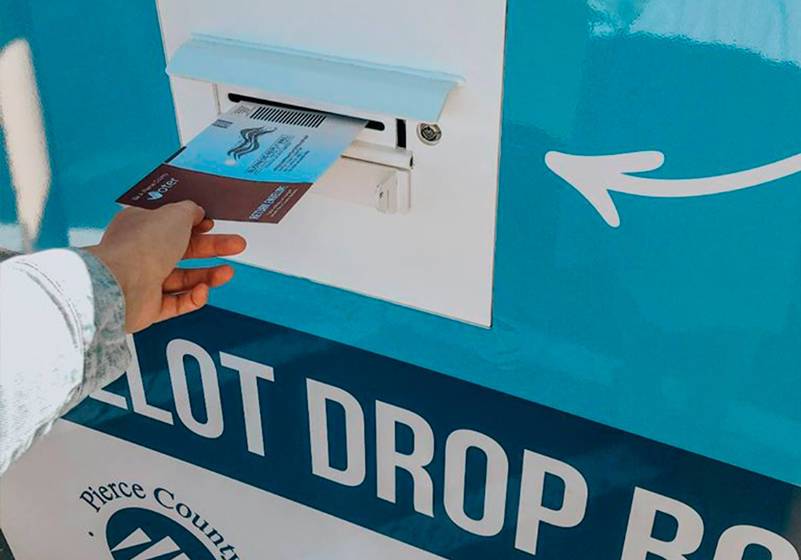By Morf Morford
Tacoma Daily Index
(Don’t) Let My People Vote
It is the right, if not obligation, of every citizen to vote on a regular basis.
Voting is the civic version of a right of passage. Making one’s voice heard in the pubic square in the choice of one’s representatives and issues is the mark of adulthood in a democratic system.
Our Founding Fathers insisted that “We the People,” not kings or dynasties, would rule ourselves.
It has been the duty, if not calling, for those representatives, who we used to call “public servants” to encourage and facilitate registration and public participation in every electoral process.
To block, suppress or intimidate voting is a crime, and on the part of public officials, obstructing voting, besides being illegal and unethical, has been unheard of.
This being 2020, where the “unheard of” has become the new standard in every arena of life, the body politic is not immune from distortion, manipulation if not outright obstruction.
We, in Washington State, are largely safe from such Machiavellian machinations, but other offices and agencies across the country seem to be doing their best to impede what is certainly the civic version of a sacred act.
Mail-in voting, which several states have had for years, and which has consistently garnered bipartisan support, is suddenly questioned, if not suspect.
Voter fraud by mail is statistically non-existent. And if you think about it, both nearly impossible and largely ineffectual if it even were possible.
Our President, for example, said that “anyone” could send out ballots.
Yes, technically that is true. But the only ballot that matters is the one that is counted. And the only ballots that are counted are those that are sent to registered voters and signed by them. These signatures are cross-checked with previous signatures (my wife and I have both had phones calls to confirm our ballot signatures).
Another objection to mail-in voting is that it would “overwhelm” the postal system.
This “argument” is embarrassing to even consider. How many ballots would come from the average house or apartment? Perhaps two or three. At most.
How many holiday cards emerge from each home during holiday season? Maybe ten or twenty. And those year-end letters that used to be so popular? I know people who send twenty or thirty or even more at the end of December.
And then there are the holiday packages.
My point is that our postal services can handle far more than a slight increase in mailings.
Plus, there are drop boxes.
For most of us.
We have almost fifty in Pierce County.
In Texas, just in time for a presidential election, the governor mandated one (!) drop off box for each county.
As you might guess, some counties in Texas are large – a few are the size of the state of Rhode Island.
Voters in Florida rescinded the prohibitions on the voting rights of felons who had served their sentences. State legislators promptly reversed this ruling and added layers of fine print to the rules regarding voting rights for former felons.
Oddly enough, restrictions on voting rights for felons is not in our Constitution.
The Constitution on voting
Only a few amendments address voting rights in America; the main Amendments that concern suffrage or voting rights for all people are Amendments 15, 19, 24, and 26.
But there are a couple others that define the electoral process outside of who gets to vote, and given that we are in the 2020 Zone, where almost anything could happen, we should look at those as well.
In the first few years, the top two candidates (of any party) were elected. The president was the one with the most votes and the vice president got the second number of votes.
That meant that the president and vice president could have come from different political parties – they may have even run against each other – as Jefferson and Adams did.
That all changed in 1804 with the passage of the 12th Amendment.
The 12th Amendment changed the rules governing presidential elections. Prior to the amendment, the president and vice president were elected strictly through popular vote. The 12th Amendment recognized the existence of political parties and specified that from that point forward, the president and vice president elections would be determined by the electoral college rather than the popular vote.
The electoral college is a group of electors from each state that is equal to the number of senators and congressmen for that state. For better or worse, the 12th Amendment makes it possible for a president to be elected without winning the popular vote.
The 15th Amendment (ratified in 1870) was designed to protect (male) U.S. citizens from being denied the right to vote based on race, color or former slave status. The amendment specified that all men over the age of 21 would be entitled to vote regardless of race or color.
The 17th Amendment (ratified in 1913) changed the way that senators are elected. Prior to the amendment, senators were elected by the legislature for each state. The 17th Amendment shifted the power to elect senators from the state legislature to the people. Senators since then have been elected by popular vote.
The 19th Amendment (ratified in 1920) made voting available to women in every state. (Wyoming was the first state to allow women to vote). Prior to this amendment, women were not able to vote in federal elections.
The 24th Amendment (ratified in 1964) made it illegal to require voters to pay a poll tax. Prior to this amendment, those of little means were excluded from casting votes because they did not have the money to pay for a poll tax. The 24th Amendment put an end to people being disenfranchised by a lack of money.
This Amendment has emerged as a factor in the re-instatement of voting restrictions on felons because of unpaid fines or penalties.
The 26th Amendment (ratified in 1971) lowered the voting age from 21 to 18.
As you can see, over our history voting rights have consistently expanded for every citizen to exercise this most basic of civic rights.
If you venture into the history of voting rights, you’ll see that each of these Amendments was the result of massive organization, if not resistance to the system as it was.
Our electoral system and its rules have always changed, almost always in the direction of more inclusive involvement on the part of legitimate voters, and I would argue, as Abraham Lincoln put it, toward “a more perfect union”.
The right to vote, like our other Constitutionally guaranteed rights, needs to be protected. As our Founding Fathers put it, voting is a “sacred trust” of every citizen.






